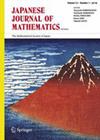关于Lax算子
IF 1.5
3区 数学
Q1 MATHEMATICS
引用次数: 3
摘要
我们将Lax算子定义为N≥1阶的单伪微分算子L(∂),使得Lax方程\(\frac{\partial L(\partial)}{\partial t_k}=[(L^\frac{k}{N}(\partial))_+,L(\partial)]\)对于无穷多个正整数k是一致且非零的。方程的一致性意味着它的流是由演化向量场定义的。在本文中,我们证明了KP和n阶KdV的传统理论对任意标量Lax算子成立。本文章由计算机程序翻译,如有差异,请以英文原文为准。
On Lax operators
We define a Lax operator as a monic pseudodifferential operator L(∂) of order N ≥ 1, such that the Lax equations \(\frac{\partial L(\partial)}{\partial t_k}=[(L^\frac{k}{N}(\partial))_+,L(\partial)]\) are consistent and non-zero for infinitely many positive integers k. Consistency of an equation means that its flow is defined by an evolutionary vector field. In the present paper we demonstrate that the traditional theory of the KP and the N-th KdV hierarchies holds for arbitrary scalar Lax operators.
求助全文
通过发布文献求助,成功后即可免费获取论文全文。
去求助
来源期刊
CiteScore
3.90
自引率
0.00%
发文量
2
审稿时长
>12 weeks
期刊介绍:
The official journal of the Mathematical Society of Japan, the Japanese Journal of Mathematics is devoted to authoritative research survey articles that will promote future progress in mathematics. It encourages advanced and clear expositions, giving new insights on topics of current interest from broad perspectives and/or reviewing all major developments in an important area over many years.
An eminent international mathematics journal, the Japanese Journal of Mathematics has been published since 1924. It is an ideal resource for a wide range of mathematicians extending beyond a small circle of specialists.
The official journal of the Mathematical Society of Japan.
Devoted to authoritative research survey articles that will promote future progress in mathematics.
Gives new insight on topics of current interest from broad perspectives and/or reviews all major developments in an important area over many years.

 求助内容:
求助内容: 应助结果提醒方式:
应助结果提醒方式:


